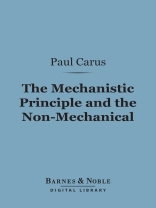This 1913 work on the philosophy of science covers a wide range of topics, including “Mechanicalism and Teleology, ” “Time and Space, ” “Man’s Divinity, ” “Mark Twain’s Philosophy, ” “La Mettrie’s View of Man as a Machine.” Carus’s study of the subject from both scientific and theistic perspectives is fair and absorbing.
Об авторе
Paul Carus (1852-1919) was a German-American author, philosopher, theologian, and editor. Brought up in an orthodox Protestant family, Carus developed liberal ideas which prompted him to move away from home to America. He edited several journals promoting free thought, then went on to write books, as well as correspond with figures such as Tolstoy, Edison, and Booker T. Washington. He pioneered interfaith dialogue, as well as created his own concept of religion, called the Religion of Science. He wrote The Soul of Man (1891), The Gospel of Buddha (1894), Nietzsche and Other Exponents of Individualism (1914), among many others.












